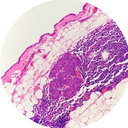rBTI induces apoptosis in human solid tumor cell lines by loss in mitochondrial transmembrane potential and caspase activation.
Cuvinte cheie
Abstract
The molecular mechanisms and the possible effects of a recombinant buckwheat trypsin inhibitor (rBTI) on the induction of apoptosis in the human solid tumor cells (EC9706, HepG2 and HeLa) were investigated. An MTT assay showed that rBTI could specifically inhibit the growth of solid tumor cells in a dose- and time-dependent manner. Analysis by flow cytometry indicated that the apoptosis of several tumor cells increased after treatment with rBTI in range of 6.25-50microg/ml. DNA electrophoresis analysis showed the 'DNA ladder', typical of apoptosis. rBTI-induced apoptosis was shown to involve Bax and Bak up-regulation, Bcl-2 and Bcl-xl down-regulation, release of cytochrome c from the mitochondria to the cytosol, activation of caspase-3 and -9 and disruption of the mitochondrial transmembrane potential (Deltapsi(m)). The z-DEVD-fmk caspase-3 inhibitor significantly inhibited rBTI-induced apoptosis. We concluded that rBTI can induce the apoptosis in several types of human solid tumor cells and promotes apoptosis through the mitochondrial apoptotic pathway.





